NEW YORK ROCK & ROLL ENSEMBLE- MANOS HADJIDAKIS
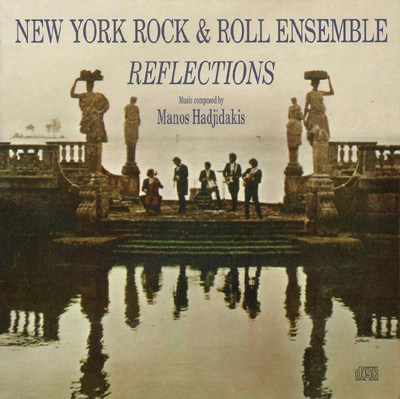
Julliard band meets Greek composer
by Hayim Kobi
(April 2018)
The second half of the 1960's brought with it interesting musical combinations as young musicians were challenging the boundaries of popular music. They found new outlets to express their growing awareness of what is possible and embraced all kinds of influences, musical or otherwise. Indian music found its way into the Beatles repertoire, The Byrds had John Coltrane on their mind when they played the psychedelic "Eight Miles High," The Moody Blues played along a full orchestra on Days of Future Passed and the list goes on. But an album that combines rock, classical and Greek music? That was uncharted territory even for the most progressive artists. It required not only musicians with a special talent, but also serendipity to bring them together at the right time and the right place. At the end of 1968 in New York City, the stars aligned. This is the story of Reflections, a gem of an album by the New York Rock & Roll Ensemble, performing the music of legendary Greek composer Manos Hadjidakis.
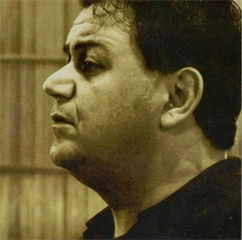
Hadjidakis has been composing music for the concert stage, films and theater since the late 1940's in Greece. A prolific composer, he quickly became one of Greece's major musical forces during the 1950's, but remained mostly unknown to audiences outside of his native country. He got his lucky break with the film Never On Sunday, a Greek variation on Bernard Shaw's Pygmalion. The movie star was Melina Mercouri who received the Best Actress Award at the 1960 Cannes Film Festival. More importantly for Hadjidakis, the title song from the film as sang by Mercouri won the Oscars for Best Song.
Never the type to seek popularity through his art, Hadjidakis was quoted for saying: "I don't care about fame. It imprisons me inside its own limitations, not mine." True to his words, he did not show up to pick the Oscar he won, generating a funny comic relief by Bob Hope, the award presenter.
The golden statuette was sent by mail, but was stolen somewhere in the Balkans. When he was asked to take a photo with the prize, Hadjidakis borrowed the Oscar of Katina Paxinou who in 1943 won the Academy Award for Best Supporting Actress for her role in For Whom the Bell Tolls.
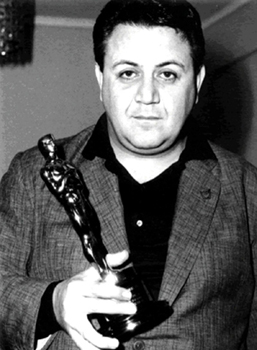
The early 1960's brought more worldwide success to Hadjidakis with films such as Aliki, My Love from 1962, for which he wrote another wonderful soundtrack combining the sound of bouzouki with orchestral arrangements. His film scoring profile rose as he started to get called by Hollywood studios to work on films such as Elia Kazan's America America in 1963. One of his best scores from that period is for the movie Topkapi, another Jules Dassin and Melina Mercouri collaboration, for which he wrote an energetic belly dance melody, forever cementing the sound of bouzouki around the world as the symbol of Greek culture.
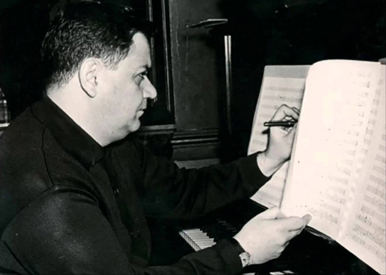
But Hadjidakis' biggest success is a song many do not know he wrote. In 1959, he wrote the song "Don't Ask The Heaven" for the Greek movie The Island Of The Brave. A legend goes that the song was written in ten minutes when the composer was visited by its film star Jenny Karezis who came knocking on his door one morning expecting the song ready for that day's shooting. The composer nonchalantly invited the actress in for a coffee, wrote the song, and had her out the door with a cassette in her hand. The song sounds familiar? Of course, for it was sent to Brenda Lee's management for consideration and after it was Americanized with English lyrics by Arthur Altman it became "All Alone Am I". Under the able hands of legendary Nashville producer Owen Bradley, the song became a 1962 mega hit for Lee, who recorded it when she was only 17. The song reached number one on the Billboard Easy Listening chart and number 3 on the Billboard Hot 100 chart. The name Manos Hadjidakis may still be obscure to most English speaking music listeners around the world, but if they know one song of his, it's this one.
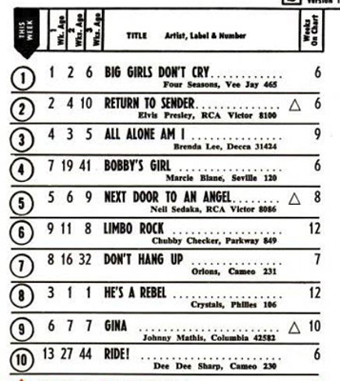
In 1966, Manos Hadjidakis arrived in New York. The purpose of the trip was to work on a stage adaptation of Never On Sunday. He had other motives for this trip, as he expressed in an interview: "In 1966 I was in America. I stayed there for six years, the years of the dictatorship, for purely tax reasons - it was revealed that I owed three and a half million to the state. When I repaid my debt, I came back around 1972." The years of dictatorship refer to the political situation in Greece, a country in turmoil around that time. A year after the composer left his native land, Greece experienced a military junta that lasted seven years. Hadjidakis' extended stay in the US exposed him to the rich musical scene that was thriving in the late 1960's, stylistically galaxies away from his Greek and classical roots. Staying mostly in New York City, he ventured out to the West Coast, and was in the audience to see The Mamas and the Papas and Melanie, and at some point, ended up staying with the Jefferson Airplane at their house, a curious episode that resulted in a near-collaboration with Grace Slick.
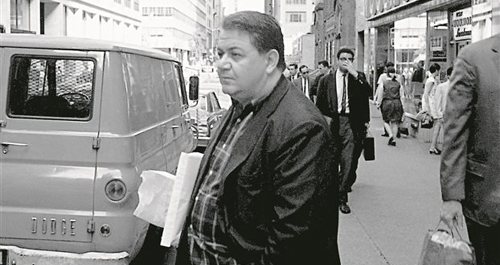
A year before his arrival in New York, the city played a major role in his recording career when Quincy Jones produced Hadjidakis' song cycle Gioconda's Smile. One of the most beloved Greek music albums, it is a wonderful set of orchestral pieces, one of them being "The Virgin In My Neighborhood". Hadjidakis said that if the song had lyrics, it would be approximately like this: "My neighbors - who were curious, amazed and in a hurry - were gathering in the church, to witness the miracle they'd heard about by word of mouth. The Weeping Madonna. I rushed there too, but the throng prevented me from entering. Full of fear and curiosity, everyone was talking about the miracle. This was the only Weeping Madonna in the whole city and this was a lot for our small and paltry neighborhood. I entreated them to let me in. I wanted to see. But they just shoved me and trod on me, until I hurt so much I too started weeping. But suddenly, when they saw me weeping, they all formed a circle around me and little by little began to move away from me. They were upset and left me all alone in the center of a constantly growing circle, and I wept and wept, weeping till I turned into a tiny spot in the public square. Meanwhile, they'd gone, they'd vanished in the nearby streets, stammering: 'The weeping Madonna'."
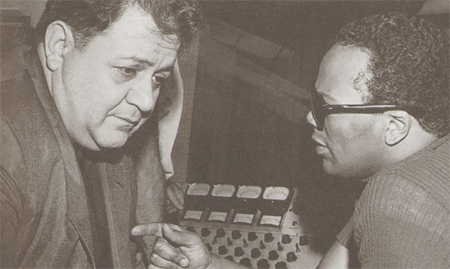
The stage production of Never on Sunday involved the original director Jules Dassin and his star actress and wife Melina Mercouri. The film turned into a musical and received the name Illya Darling. The show ran for over 300 performances in 1967, but its star's successful film career and sex appeal did not turn it into a hit. Turning the colorful Piraeus scenery into an English speaking musical sugared up the essence of its charm and the show did not quite hit the mark, as in one of its popular songs "Medea Tango".
The prolific film composing career that Manos Hadjidakis had prior to his exile in the US took a deep dive after his arrival. Compared to about 60 scores he wrote to mostly Greek movies between 1946 and 1966, he added only four more during his six year stay abroad, all of them for American productions, none of them as significant as his earlier film work.
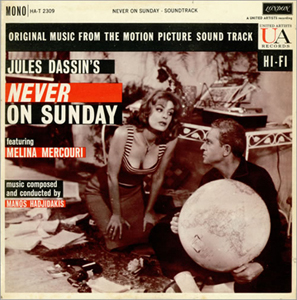
But his composing output has not suffered a bit, as he shifted his focus back to his most beloved activity, writing classical music influenced by Greek folklore. One of them was "Rhythmology, Op. 26," his last piano composition, which he completed in 1971. There are twelve piano pieces here, half of them written in an odd rhythm, starting in 5/8 and followed by 7/8, 9/8, 11/8, 13/8, and 15/8. Unlike most Balkan and Greek music in those meters, there is no strong rhythmic pulse here, as you can hear on the Eric Satie influenced piece in 9/8.
It may be his love of both the American musical scene and classical music that brought him in 1968 into an Atlantic recording studio in New York to watch a recording session by a curious rock band whose members were versatile in playing rock and classical instruments. Enter the New York Rock & Roll Ensemble.
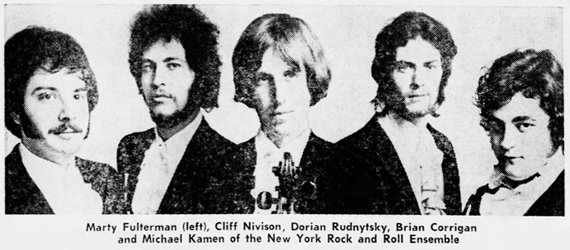
The band started at Juilliard School, where three classical music students found that they shared the same musical tastes within and outside of the classical music domain. Dorian Rudnytsky played bass and cello, Michael Kamen on piano and oboe and percussion and oboe player Marty Fullerman performed together at various school functions and dances. Two guitarists from the rock scene were added to the fold, Brian Corrigan and Clif Nivison, and the band's lineup was complete. Through a connection with an engineer at Atlantic Studios in New York, they got a one hour slot to do a demo one night, a session that quickly morphed into a full night professional recording. When it reached the ears of label manager Ahmet Ertegun, the seasoned man immediately offered them a contract. They were still school students at the time. The name New York Rock & Roll Ensemble was sealed and the first album was completed. While some of the self titled debut consists of short songs that do not stand out compared to the music scene of 1968, it also includes pieces that are clearly unique with their blend of rock and classical music. The suite "Seasons" that closes the album is a good example.
Following the album release, the band started to play the college circuit and small venues. One of these concerts was attended by Manos Hadjidakis, who was impressed by the rock group's classical leanings and saw an opportunity to collaborate on a new project he was involved in.
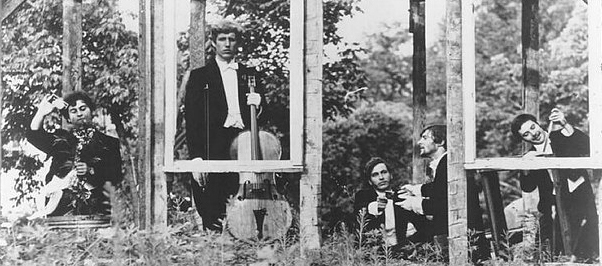
Ulvi Dogan, a Turkish film producer, released a movie in 1964 called Dry Summer. The film was a success in its native country, and the producer was looking to re-release it to American audiences with an adapted score by Manos Hadjidakis and a new title: Reflections. The composer was interested in writing songs with lyrics, sang in English, and given his compositional style thought that a band like the New York Rock & Roll Ensemble could help him realize the project by writing the lyrics and performing the songs. The band was not familiar with his vast repertoire, but knew of him as the Oscar-winning composer of Never On Sunday and agreed to collaborate, even though this was a drastic career detour for them. And so began the unlikely collaboration between a 44-year-old Greek composer and a young American rock group. Dorian Rudnytsky remembers: "Manos began to play parts of his music to show us what he had in mind for us and the film. I remember exactly at that moment, that I was suddenly impressed so much by the intense little man. Perhaps because my personal background came from Ukraine and I grew up with listening to traditional Ukrainian music, I immediately felt like I was at my house." On to the songs now.
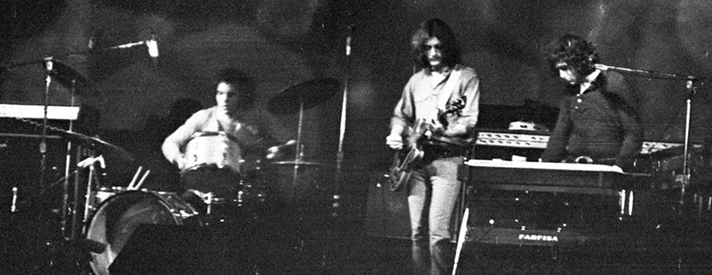
Rudnytsky wrote the lyrics for the album opener "Orpheus" and sings lead vocals on it. Is it classical, is it Greek, is it Rock? All of the above. You hear electric keyboard resembling a harpsichord, an oboe, electric guitars, English lyrics with western harmonies and some ethnic flavor to it all.
The second song, "The Day," starts with a rock riff followed by a bouzouki run (not sure who plays that part, uncredited on the album sleeve and likely Greek musicians based in NYC at the time). Lyrics and lead vocals by rhythm guitar player Brian Corrigan.
"Sitting in the time of day when the sun is very warm
Dreaming in a kind of way that a dream is always born
Drifting with the things I feel when I put away my will
Sleeping in the time of day when the sun is very still."
Both composer and band are on new territory on this album. It is truly one of the best collaborations between very distinct cultures, where the result could not have been reached any other way. The songs really are the intersection of what the two parties brought to the table. One of my favorite songs on the album, "Love Her," is a great example, with lyrics by Brian Corrigan and lead vocals by Clifton Nivison. I love the piano and string arrangements on that one.
One of the album's most lasting songs is "Kemal," of which Hadjidakis said: "In New York City in the winter of 68, I met a young twenty-year-old boy called Kemal. I met him. What a big and memorable name for such a beautiful and young boy, I thought. I imagine, he wanted to be lost in America." Martin Fulterman who wrote the lyrics recalls otherwise: "I do not know what Manos had in mind when he was writing the music, but literally there is no story behind the song. The lyrics are the creation of my fantasy, maybe about comedians, as far as I remember."
"In the land of Ali Baba near the Sea of Babalee,
Lived a man who played the zither with a pronoun on his knee.
He would dance among the fuzzy trees and bring the birds to life
And his name was Prince Bass Fiddle and he loved his ugly wife."
My personal favorite song on the album is "Dedication," for its longing melody, wonderful arrangement and Michael Kamen's vocals. The lyrics by Clifton Nivison are also some of the best on the album: "We were very young and in a wonderful musical period when I wrote "Dedication." That inspired me. We felt that our life was in front of us, while the message of the piece was that things would always turn better."
"Feels like I'm getting older, I'm not afraid
Although I'm miles apart from yesterday
And yet I can't believe I'm old enough today
To be in love and feel in love and see if love's the way"
"Street Song" is a showcase tune that highlights the band's great technical ability in handling an intricate Balkan rhythmic patterns, usually quite foreign to Western ears. I am pretty sure that these parts had to be read from a musical score, something that their self-trained rock contemporaries would have found difficult to master. Hadjidakis gave the group an important advice for handling those patterns - listen to the melody, the rhythms are there to support it.
Another tune that demonstrates the excellent collaboration between the composer and the band is "Bitter Way," with a string arrangement, oboes played by Kamen and Fulterman and a French horn by Rudnytsky. The melody, like a few other tracks on the album, is one of Hadjidakis' farthest divergences from the Greek melodies he is known for, and the arrangement sounds like a soulful soundtrack to a dramatic film.
And we come to the last song on the album and one of the best-known from it, "Noble Dame." The rhythm is in 5/8, a typical Balkan meter, and the use of harpsichord works very well here. Brian Corrigan said of Hadjidakis: "It was very easy to work productively with him because of his love for music. I loved the way he wrote it and I felt that this Mediterranean style was very close to me." Indeed the band sounds very authentic on this song. The story behind the lyrics, told by Dorian Rudnytsky: "My basis was an earlier relationship I had had with, indeed, a noble young lady (a Baroness) from Germany. She was the basic image I wrote at, and of course then with imagination altered to become the person in the song called the 'Noble Dame.' Life took its most peculiar and wonderful course, and I met this Baroness again many many years later. One thing led to another, and now Brigitte and I are married, and I am in Germany due to her marvelous presence in my life."
The recording sessions for the album took place in December of 1968 and January of 1969. The film producer Ulvi Dogan came from time to time to visit the sessions, but after all the material was recorded he was not pleased with the end result and did not see it suitable for his film. Maybe the fact that 8 of the 10 tracks on the album had English lyrics deemed it unsuitable as a soundtrack. After an intense exchange of words with Hadjidakis, the two parted ways and the original plan for a soundtrack was abandoned. The recordings remained unreleased in Atlantic's vaults and the band proceeded to record their second album, Faithful Friends. Stylistically it resembles their debut album, "Branbdenburg" a good example of the "Classical piece turns Rock" that they mastered so well. The piece was written for one of the Young People's Concert Leonard Bernstein arranged in the late 1960's, following a prestigious invitation by the famous composer/conductor.
But the first phase of the band was nearing an end after the second album's release as Atlantic lost interest in them. The label, as adventurous and risk taking as it was then, had much bigger rock bands to focus on. The New York Rock & Roll Ensemble had a 3-year, 3-albums contract with Atlantic, and as they lost their appetite to record more material for the label, the idea of releasing the sessions they did with Hadjidakis under their own name came about. They knew that this drastic change in style may seem peculiar to their fans, but they went with it and of course the album tanked gloriously on its release.
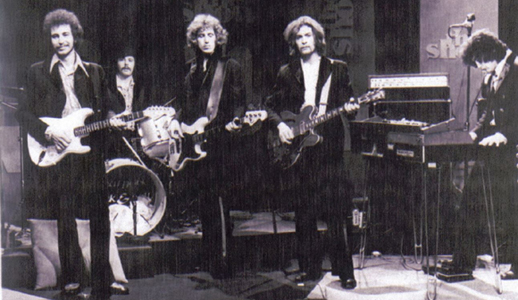
Time has treated the album well. The music sounds as fresh today as it was in the late 1960's. The album became the band's most commercially successful due to sales outside of the US, mostly in the Mediterranean countries including Greece, where newer versions of the album both in Greek and English were recorded over the years. "Kemal," with Greek lyrics by poet Nikos Gatsos and sang by Aliki Kayaloglou, was recorded in 1993.
In 2011, the Greek band Raining Pleasure released a homage album to Reflections, playing all songs from the original album in the same order, with the original English lyrics. An interesting adaptation to modern sounds and recording techniques, although I miss the classical instruments and orchestral arrangements of the original. "Dance of the Dogs," which I did not include in this review, is a good rocking/electronic take.
And what of that Turkish movie, you ask? Dry Summer, turned Reflections as its title, was eventually released in the US in 1975 to lukewarm reviews. Nearly 50 years after the recording sessions, it seems as if time favored the music better than the film.
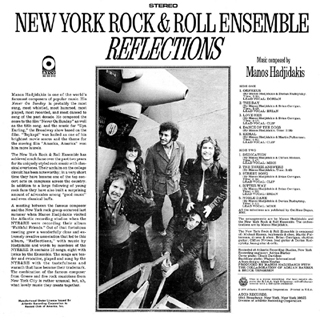
The New York Rock & Roll Ensemble proved to be a good apprentice school for its members. After the typical rock and roll band's life cycle of departing members and lineup changes, the band was done after a few more albums. Marty Fulterman became Mark Snow and hit success on the TV show circuit, his claim to fame the score to the hit show The X Files. Dorian Rudnytsky kept working as cellist and bass player with various TV, film and theater productions in the US and Europe. Clif Nivison kept the music going in various cover bands on the East coast. Brian Corrigan left the music industry. Michael Kamen was the most successful of the band's members, becoming a world renowned film composer, with mega hits such as the Die Hard and Lethal Weapon series and more interestingly films such as Brazil and Mona Lisa. Rock fans will find it interesting that he was the musical director and played electric piano, Moog and oboe on David Live, David Bowie's live album from the Diamond Dogs tour in 1974. He also scored the orchestral arrangements for Pink Floyd's The Wall. Sadly Michael Kamen passed away in 2003 at the young age of 55, as he was preparing a reunion of the New York Rock & Roll Ensemble planned to take place at the 2004 Summer Olympic Games in Athens. That would have been a wonderful backdrop for a reunion, but alas. We are left with Reflections, a forgotten gem of an album from time passed.
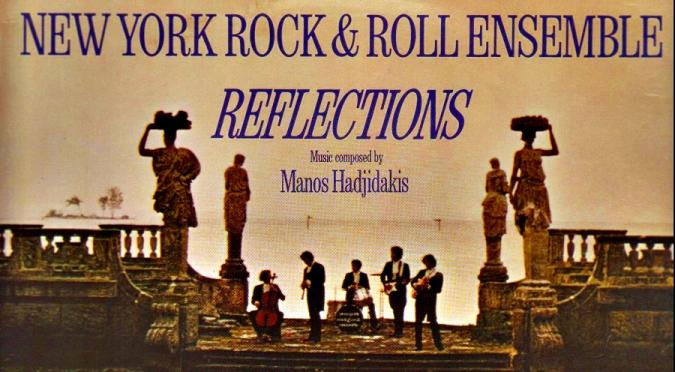
Sources:
- Giorgos Kovos "The American Manos" (BHMagazino, June 11, 2017)
- Liner Notes for Manos Hadjidakis Gioconda's Smile (Fontana, 1965)
- Richie Unterberger, Liner Notes for The New York Rock & Roll Ensemble Reflections (Collector's Choice Music, 2006)